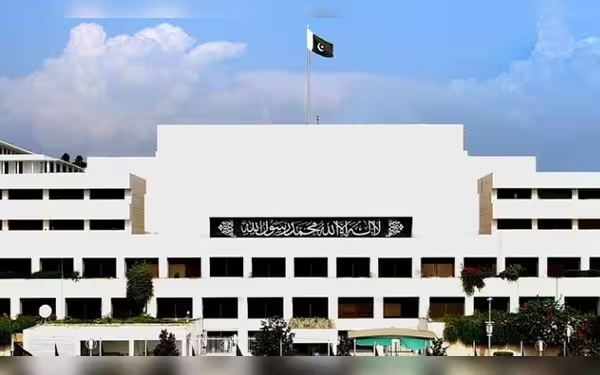Saturday, September 28, 2024 07:26 PM
Parliament Lodges Designated Sub-Jail for PTI MNAs in Pakistan
- Parliament lodges declared sub-jail for PTI MNAs.
- Minimum wage of Rs 37,000 announced for nurses.
- Government initiatives launched for women's health improvement.
 Image Credits: thefrontierpost
Image Credits: thefrontierpostPakistan's parliament lodges designated as sub-jail for PTI MNAs; minimum wage for nurses set at Rs 37,000 amid women's health initiatives.
In a significant development within Pakistan's political landscape, National Assembly Speaker Sardar Ayaz Sadiq has declared the parliament lodges as a sub-jail to accommodate incarcerated members of the Pakistan Tehreek-e-Insaf (PTI) party. This decision comes in response to a request from PTI MNAs, who sought to be moved from their current detention facilities to the more comfortable environment of the parliament lodges. The arrangements for this transfer were finalized on Friday, with all ten arrested PTI MNAs expected to be relocated on the same day.
Prior to this decision, Speaker Ayaz Sadiq engaged in detailed discussions with Interior Minister Mohsin Naqvi regarding the request from the PTI members. A formal notification has been issued to officially designate the parliament lodges as a sub-jail. The arrested MNAs, including notable figures such as Sheikh Waqas Akram and Zain Qureshi, were previously presented at the National Assembly session under heavy police escort, highlighting the tense atmosphere surrounding their detention.
In a separate yet equally important matter, Minister for Information, Broadcasting, National Heritage and Culture Attaullah Tarar addressed the National Assembly regarding the implementation of a minimum wage for nurses and paramedical staff in private hospitals. He announced that the government would enforce a minimum wage of Rs 37,000, ensuring that all private hospitals comply with this directive. Currently, nurses earn between Rs 30,000 and Rs 50,000, while paramedical staff receive between Rs 20,000 and Rs 30,000. Tarar emphasized that hospitals failing to adhere to this wage policy would face strict consequences.
Furthermore, the minister highlighted the government's commitment to enhancing the training of nurses through the National Vocational and Technical Training Commission (NVTTC). This initiative aims to meet the increasing demand for healthcare professionals both domestically and internationally, particularly in the Middle East and Europe. Tarar also supported the introduction of nursing as a subject in educational curricula, recognizing the importance of formal education in this field.
Addressing women's health issues, Tarar outlined several government initiatives aimed at improving maternal health and reducing complications related to pregnancy and childbirth. These initiatives include the establishment of Postpartum Family Planning guidelines and the Essential Package of Health Services, which focus on family planning and maternal care. The government has also launched national campaigns for breast and cervical cancer awareness, particularly targeting rural areas.
According to the World Health Organization, approximately 40,000 women die from breast cancer globally each year. In response, the Pakistani government is actively working to raise awareness and provide necessary screenings, especially in underserved communities. The collaboration between the Ministries of Health and Information is crucial in ensuring the success of these awareness campaigns.
In terms of healthcare access, the Universal Health Coverage (UHC) initiative for Islamabad began on January 1, 2022, providing health cards to families until December 15, 2023. However, coverage has since been restricted to families below the poverty line, as defined by the Benazir Income Support Programme survey.
The recent developments in Pakistan's political and healthcare sectors reflect the government's ongoing efforts to address pressing issues, from the treatment of detained political figures to the enhancement of healthcare services for the public. As the situation evolves, it remains essential for citizens to stay informed and engaged with these critical matters that impact their lives and communities.













